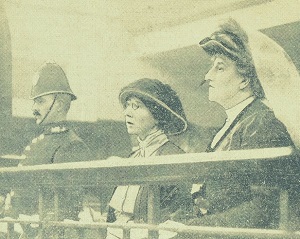Ethel Moorhead (alias Edith Johnston, Mary Humphreys, Margaret Morrison) (1869 – 1955)

Ethel was one of the movement's most militant personalities. Born on 28th August 1869 in Maidstone, Kent, she was one of six children of an Irish army surgeon, George Moorhead and Margaret Humphreys. She was raised in India, Mauritius and South Africa where her father was employed. She trained as an artist in Paris between 1898 and 1901.
The family moved to Dundee in 1900 and Ethel returned home to look after her elderly parents, exhibiting her artwork in her studio and across Britain. Her mother died in 1902 and Ethel cared for her elderly father until his death in 1911.
In December 1910 she threw an egg at Winston Churchill when he held a meeting there and in 1911 she argued with census officials and refused to take part.
Ethel symbolically smashed a glass case at the Wallace monument near Stirling in the Autumn of 1912. When she was arrested she gave her name as Edith Johnston and served a 7 day imprisonment for that offence. In October she was ejected from a meeting in Edinburgh's Synod Hall and marched into a classroom with a dog-whip to attack a male teacher who was responsible for having her removed. She paid a £1 fine to avoid a prison sentence. In December she was arrested in Aberdeen for causing a disturbance and imprisoned under the name Mary Humphreys. She served four days of her 10 day service after part of her fine was paid for her release.
In January 1913 she threw cayenne pepper into the eyes of a police constable and was arrested in Leven as Margaret Morrison. In her police cell she broke all of the window panes and threw a pailful of water over a police constable. In court she refused to stand or remove her veil to be identified. Sentenced to 30 days' imprisonment, she was released after only two days, having begun a hunger strike upon her arrest.
In July 1913, as Margaret Morrison, she was held in Duke Street prison, Glasgow, for attempted fire-raising. She had been joined by Dorothea Lynas or Chalmers Smith.
During the war she helped to run the Women's Freedom League National Service Organisation, campaigning for women war workers to be properly paid.
In the 1920s she travelled with her protege Ernest Walsh and co-edited an English-language review of art and literature.
She died in a nursing home in Dublin on 4th March 1955.
Ethel's case can be examined in file 1 and file 2 held by National Records of Scotland.
